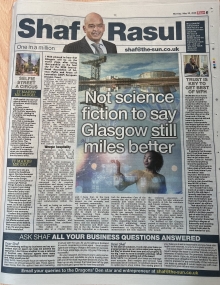My Column
Not science fiction to say Glasgow STILL miles better
- Date: Monday 22nd May 2023

I was pleased to hear that Glasgow will be on the world stage after being cherry-picked as the host city for the 2024 International Association of Science Parks and Areas of Innovation (IASP) European Division Event.
Without a doubt this decision reinforces the city’s position as a hub for innovation and scientific advancement.
For those of you who aren't aware of what the event is, IASP is a prestigious gathering that brings together key players in science, technology, and innovation from across Europe.
The University of Strathclyde will host it in 2025, providing an incredible opportunity for Glasgow to showcase its brilliant research institutions, cutting-edge technologies, and entrepreneurial ecosystem to an international audience.
Glasgow has proven itself more than capable of organising and executing large-scale events, starting as far back as the famous Glasgow Garden Festival in 1988, and more recently the Commonwealth Games in 2014 and COP26 less than two years ago.
This track record of proving Glasgow is miles better when it comes to staging major events means it continues to be a go-to destination for everything from international conferences to sporting events, and cultural festivals.
Glaswegians must have a huge sense of pride in its international reputation which I’m sure is helped by our warm and welcoming Weegie hospitality.
And as the city continues to develop its infrastructure and enhance its business-friendly environment, this can only get better. We can continue to capitalise our successes and bring even more events that will foster continued economic growth and development.
The University of Strathclyde, renowned for its research capabilities and strong industry connections, provides a brilliant backdrop for this gathering of scientific minds.
This event will not only boost Glasgow's international reputation but also serve as a catalyst for fostering innovation and collaboration within the city.
As well as being an endorsement of the city's growing importance as leader in innovation and entrepreneurship, the event will attract a diverse range of stakeholders and delegates, including venture capitalists, business leaders, and representatives from multinational corporations.
This influx of attendees comes also at a crucial time and I hope that in the long term it will have a positive impact on our economy and our business community.
I hope Glasgow grabs the opportunity to showcase all of its own brilliant success stories and its depth of knowledge which learning from other European counterparts.
Such exposure could lead to increased collaboration, investment, and the establishment of new businesses and R&D centers in the city, further benefiting its reputation as a dynamic hub for innovation.
One of the reasons the city is able to successfully host major events is because it’s continually investing in its infrastructure, for example the multi-billion-pound investment for the Clyde Metro which was recently confirmed by the Scottish Government.
Further investment includes upgrading transportation networks, expanding hotel capacities, and enhancing event venues and facilities.
The city's commitment to improving its infrastructure not only supports the seamless execution of major events but also enhances the quality of life for residents and future visitors.
Most importantly though, events like these often leave a lasting legacy that can shape the city's future trajectory. Glasgow can once again leverage this opportunity to develop strategic partnerships.
I’m thrilled to see Glasgow poised to embrace the opportunities presented by hosting this influential gathering of scientific minds.
SIDE (280 words)
Working from home has been a particularly hot topic in the past week after research revealed that the work-from-home model benefits those on a higher wage more than those on a low income.
I wasn’t hugely surprised to read this because many jobs that often sit on the lower end of the pay scale are service-led jobs and simply can’t be done in person.
Unfortunately that means that being offered options such as working from home or flexible hours are simply not an option as the job doesn’t led itself to this.
However, when I read more information on the research, that wasn’t actually cited as the reason why.
Interestingly, the team behind the research reckoned part of the problem could be lack of trust between employers and employees.
It appears that bosses simply don’t trust their teams to do their jobs unless they’re sat under their noses.
Come on. Haven’t we learned anything since the pandemic?
It forced employers to take a leap of faith that they might never have taken, when ‘work from home if you are able to’ was imposed.
We have the technology to keep in touch, and some workers even found they saw MORE of their colleagues than ever.
So I wouldn’t be in too much of a rush to rewind back to the old days. I recently read that more than a third of people were more likely to quit their job if working from home wasn’t an option.
That should be a word of warning for dinosaur bosses who have the ability to let their people get on with the job but refuse to place trust in them. Personally I think that granting a degree of autonomy and showing you trust your people makes them want to work harder for you and prove they have earned it.

